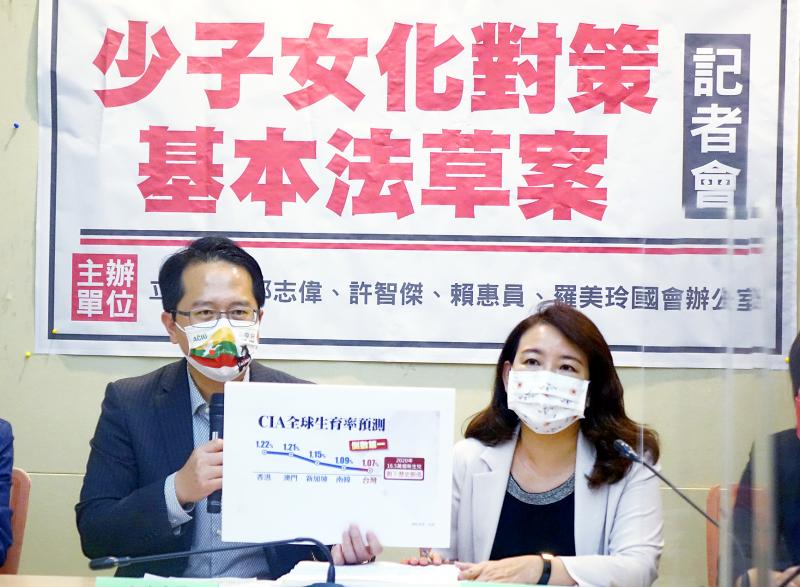Legislators yesterday proposed enacting a basic law to address the nation’s dwindling birthrate.
The proposed legislation would define the roles that the government, and business and civil groups would have in tackling the issue — an approach that its sponsors believe would give the matter needed legal specificity.
Democratic Progressive Party (DPP) Legislator Chiu Chih-wei (邱志偉), who proposed the bill, along with sponsors and fellow DPP legislators Hsu Chih-chieh (許智傑), Lai Hui-yuan (賴惠員) and Loh Meei-ling (羅美玲), announced the bill at a news conference at the Legislative Yuan in Taipei.

Photo: Wang Yi-sung, Taipei Times
Taiwan last year registered a decline in population for the first time, and in the first half of this year recorded 6.46 percent fewer births than in the same period last year, Lai said.
Considering next year is the inauspicious Year of the Tiger, Lai said that the birthrate would likely fall even lower, necessitating legislative action as soon as possible.
The bill is a direct result of a public hearing held by Chiu in February to ascertain from experts and officials the reasons behind the nation’s population woes and potential solutions.
The main takeaways were suggestions to set up a Cabinet-level task force and pass dedicated legislation to address the problem, Chiu said.
The government currently tasks individual agencies with setting their own policy, a strategy that lacks coordination as well as oversight, he said.
There is no standard for evaluating performance, nor is the legal system effectively utilized, he said.
Based on Japan’s 2003 Basic Act for Measures to Cope With Society With Declining Birthrate, the bill aims to clearly define the rights and responsibilities of various groups, including different levels of government, and business and civil organizations, Chiu said.
The Japanese law has helped boost that nation’s birthrate, but a lack of coordination in Taiwan has stymied the efforts of individual agencies, Loh said.
According to the draft, the Executive Yuan would be required to coordinate different agencies, as well as give an annual report to the legislature on results, while holding local governments accountable for implementing policies.
The policies called for in the bill include a sound public and quasi-public childcare environment, subsidies for fertility treatments and measures to reduce the financial burden of child rearing, such as childcare subsidies, and healthcare, preferential housing and tax incentives.
The bill would also provide a legal basis for agencies to budget for related policy.
Childcare is the most pressing issue facing parents today, Hsu said.
Even though the number of quasi-public preschools is on the rise, they still only account for less than 60 percent of all preschools nationwide, he said.
Population policy must start in the public sector, Hsu added.

Taiwan is stepping up plans to create self-sufficient supply chains for combat drones and increase foreign orders from the US to counter China’s numerical superiority, a defense official said on Saturday. Commenting on condition of anonymity, the official said the nation’s armed forces are in agreement with US Admiral Samuel Paparo’s assessment that Taiwan’s military must be prepared to turn the nation’s waters into a “hellscape” for the Chinese People’s Liberation Army (PLA). Paparo, the commander of the US Indo-Pacific Command, reiterated the concept during a Congressional hearing in Washington on Wednesday. He first coined the term in a security conference last

Prosecutors today declined to say who was questioned regarding alleged forgery on petitions to recall Democratic Progressive Party (DPP) legislators, after Chinese-language media earlier reported that members of the Chinese Nationalist Party (KMT) Youth League were brought in for questioning. The Ministry of Justice Investigation Bureau confirmed that two people had been questioned, but did not disclose any further information about the ongoing investigation. KMT Youth League members Lee Hsiao-liang (李孝亮) and Liu Szu-yin (劉思吟) — who are leading the effort to recall DPP caucus chief executive Rosalia Wu (吳思瑤) and Legislator Wu Pei-yi (吳沛憶) — both posted on Facebook saying: “I

The Ministry of Economic Affairs has fined Taobao NT$1.2 million (US$36,912) for advertisements that exceed its approved business scope, requiring the Chinese e-commerce platform to make corrections in the first half of this year or its license may be revoked. Lawmakers have called for stricter enforcement of Chinese e-commerce platforms and measures to prevent China from laundering its goods through Taiwan in response to US President Donald Trump’s heavy tariffs on China. The Legislative Yuan’s Finance Committee met today to discuss policies to prevent China from dumping goods in Taiwan, inviting government agencies to report. Democratic Progressive Party Legislator Kuo Kuo-wen (郭國文) said

The Ministry of Economic Affairs has fined Taobao NT$1.2 million (US$36,900) for advertisements that exceeded its approved business scope and ordered the Chinese e-commerce platform to make corrections in the first half of this year or its license would be revoked. Lawmakers have called for stricter supervision of Chinese e-commerce platforms and more stringent measures to prevent China from laundering its goods through Taiwan as US President Donald Trump’s administration cracks down on origin laundering. The legislature’s Finance Committee yesterday met to discuss policies to prevent China from dumping goods in Taiwan, inviting government agencies to report on the matter. Democratic Progressive Party